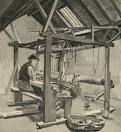It had been quite a while since I'd done any digging into our own family past, mainly because of the work I'm doing for other people. So last week I got stuck into it and hit a rich vein of information which enabled me to not only confirm some work I had done earlier, but trace our name back to the latter years of the Tudor Dynasty. I have a new marker in the ground placing us in 1595, just several miles from where we are now.
My husband was initially delighted to learn that his forebears had been around the local area for so long; however upon my revealing the fact I had found several generations back we resided in neighbouring Wigan, his delight gave way to dismay. It's a Rugby League thing and if you're not at least from the North of England you'll probably have no idea what made him so crestfallen. St Helens and Wigan share a very fierce old Rugby rivalry, which my husband is very sensitive toward, being a diehard Saints fan. The look on his face was a picture, if it had been an election, I'm sure he'd have demanded a recount. His discomfort was eased when I reminded him that St Helens didn't exist as a town as we know it today in the times I was talking to him about. Wigan has a much older pedigree and it was therefore not surprising to find the family ancestors here if they were to be in the local area.
It is fascinating to place individuals discovered into the broader context of national or international history and it was therefore most exciting to realise that with Peter from 1595, I had found the family just eight years after the Spanish Armada, eight years before Gloriana herself, Elizabeth I passed away and in the century when the root vegetable which was to ultimately revolutionise our eating was introduced, the humble potato! As I moved through the centuries I tracked the English Civil War, the beheading of Charles I, Cromwell and the Commonwealth of England, the Restoration of the Monarchy, the Great Fire of London, the Battle of Trafalgar, the Battle of Waterloo and so on and so forth. I wondered how in these times the Tabern ancestors might have got this news? Did any of the events affect them with family members? More research required there. Did they actually care? The news would have been told to them almost certainly orally, perhaps in Church on Sunday by the Minister. Pamphlets and posters appeared in the 16th Century telling the news, and abounded by the 17th, but amongst the masses reading would not have been common and therefore they would have been reliant on someone able to read to tell them.
Previous researches had revealed that the family had arrived in St Helens, like many other families had for the work available in the growing coal and glass industries, which St Helens had effectively grown from; however my new excavations had uncovered that prior to this period we were to be found in and around the Wigan area employed mainly in the weaving industry. In the 16th and 17th Centuries the industry was primarily a cottage one, with individuals working from home (not a new invention is it?) or indeed in only small primitive factory systems. These circumstances would not see change until the industrial revolution of the mid 18th Century, when the "dark satanic mills' we all associate with the craft would start to appear, mechanising the industry and creating jobs in a factory environment attracting the weavers in, working hard long hours in dangerous conditions. It appears the Taberns had shifted to St Helens and the coal/glass industry by the late 18th Century and the rest is (family) history as they say!
Another fascinating thing is how the name Tabern changed over the centuries. The chap born in around 1595 was called Peter Tabbener. I also found variants such as Tabearnar, Taberner, Tabernor Tabourner, before appearing to settle on the current version around the end of the 18th Century. This is of course an area which sometimes perplexes the amateur genealogist, who find themselves unable to progress as they are unable to find the right surname. Subtle changes can be picked up, the odd letter different here or there and the story continues; however other times as can be seen from the Tabern variants, it is easy to dismiss findings as nothing to do with your family. There are many reasons for this, chief amongst them are the people who were writing the information down at the time, who would write it as it may have sounded from the person telling him. The individual giving the information in poorer families, in all probability wouldn't be able to read or write. Indeed on some of the certificates and information I have found for the Tabern name, they have simply made their mark. Therefore they would not be in a position to confirm any spelling. And of course add to this that again with poorer families there may have been no official way of spelling the name anyway.
The further back one is able to go with their family tree quest, the harder the information can be to decipher and determine its relevance. This is where the services of a professional genealogist can really help with what you might call roadblocks on your journey to the past.


